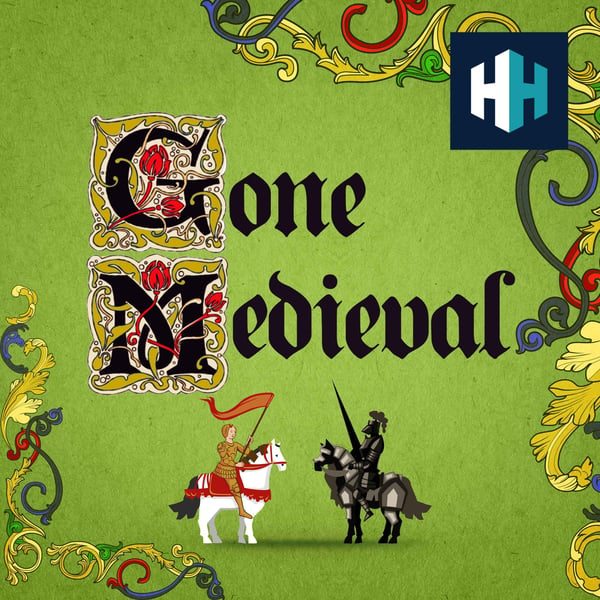Urban Life in Medieval Cities
Gone Medieval
History Hit
4.6 • 2.2K Ratings
🗓️ 14 June 2022
⏱️ 40 minutes
🧾️ Download transcript
Summary
Between 1000 and 1500, European towns and cities started to take shape, impacting the lives of millions of people as different cultural, social and religious groups began to interact. But who was allowed to settle in a city and how was it decided who belonged?
In this edition of Gone Medieval, Dr. Cat Jarman talks to Professor Miri Rubin, author of Cities of Strangers: Making Lives in Medieval Europe, about migration into urban communities, how newcomers were treated and what happened when strangers became neighbours.
The Senior Producer on this episode was Elena Guthrie.
The Producer was Rob Weinberg.
It was edited and mixed by Seyi Adaobi.
For more Gone Medieval content, subscribe to our Medieval Mondays newsletter here.
If you'd like to learn even more, we have hundreds of history documentaries, ad free podcasts and audiobooks at History Hit - subscribe today! To download, go to Android or Apple store.
Join the History Hit Book Club in time for the June and July read of Charles Spencer's The White Ship. Become part of a community of readers who are passionate about history and its thrilling lessons. Members read a new book every two months, and get a £5 Amazon voucher towards the cost of the book, as well as exclusive access to an online Q&A between History Hit presenters and the author in the second month.
Hosted on Acast. See acast.com/privacy for more information.
Transcript
Click on a timestamp to play from that location
| 0:00.0 | If you're a fan of the podcast, I've got some exciting news for you. We're publishing a book. |
| 0:04.7 | If you've ever wondered, who was the third man on the moon? Why was a pigeon a hero in the |
| 0:09.6 | American army? And wasn't Napoleon really all that small? Then the history hit |
| 0:14.0 | Marcelini will have the answer. It's available for pre-order now and will be published on |
| 0:18.5 | the 28th of September. Pre-order from your favourite bookshop or visit historyhit.com forward slash book. |
| 0:29.8 | Hello and welcome to Gone Medieval from History Hit. I'm Dr Cat German. |
| 0:35.2 | Around 80,000 urbanities starts to really take a hold in Europe. Towns and cities had really |
| 0:42.7 | developed in the early medieval period but it's over this next 500 year period or so that these |
| 0:48.8 | began to really take shape. And this new urbanity had a huge impact on millions of people's lives |
| 0:55.9 | and importantly on the interaction between different cultural, social and religious groups. |
| 1:02.3 | But who was allowed to settle in a city and how was it decided who belonged and who didn't? |
| 1:09.7 | This is precisely the topic of the book, Cities of Strangers Making Lives in Medieval Europe. |
| 1:15.6 | The book is written by a medieval and early modern historian Professor Mary Rubin at Queen |
| 1:20.4 | Mary University of London who's also the precedent of the Jewish Historical Society of England. |
| 1:26.6 | In her book, Mary explores the migration that took place throughout Europe into urban communities |
| 1:31.8 | and especially how certain groups of newcomers were treated and what happened when these |
| 1:36.8 | strangers became neighbors. So Mary, thank you so much for coming on the podcast today. I'm |
| 1:43.3 | really delighted to have you here. Good to be here. So I was really intrigued when I saw the |
| 1:48.9 | title of your book, Cities of Strangers and especially that concept of strangers and I want to ask you |
| 1:56.9 | about those particular groups that you talk about later on in this conversation but I just |
| 2:02.9 | quickly before we start this idea of that particular word, strangers. Do people in the medieval |
| 2:08.8 | period talk about strangers? Or is it a modern concept that you've just applied? |
... |
Please login to see the full transcript.
Disclaimer: The podcast and artwork embedded on this page are from History Hit, and are the property of its owner and not affiliated with or endorsed by Tapesearch.
Generated transcripts are the property of History Hit and are distributed freely under the Fair Use doctrine. Transcripts generated by Tapesearch are not guaranteed to be accurate.
Copyright © Tapesearch 2025.

